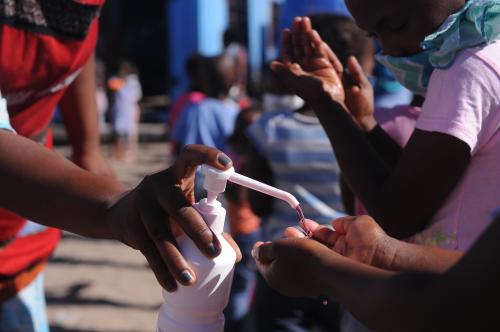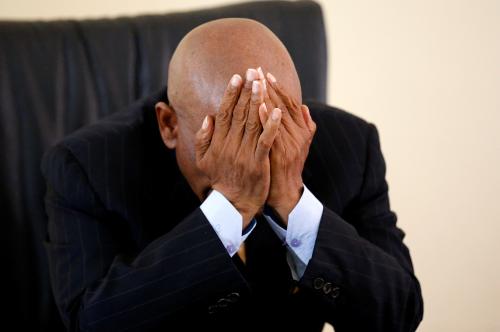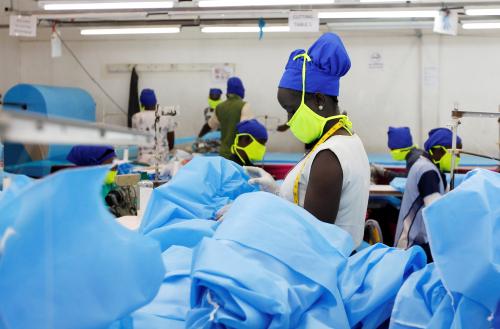Namibia begins to open up, while other countries feel the effects of COVID-19
On May 29, Namibia announced that it would further ease coronavirus-related restrictions beginning June 2. The move from level two to level three of its four-level lockdown system will permit schools to resume face-to-face classes, restaurants to receive sit-down customers, and gatherings of up to 50 people to take place. Of Africa’s nearly 130,000 confirmed cases, Namibia has just 22 of them. The country’s swift response, which has resulted in zero deaths to date, has garnered international praise. On March 13, with only two confirmed cases of COVID-19, Namibia declared a state of emergency and banned inbound and outbound travel from Doha and Addis Ababa. Eleven days later, the country instituted stricter measures, including banning travel into the country for 30 days, permitting only those whose mission was “critical to the national interest” into the country after serving a mandatory and supervised 14-day quarantine.
Restrictions in other countries in the region remain in place. Some fear that disrupted supply chains following coronavirus restrictions may exacerbate food insecurity in West Africa. The Permanent Interstate Committee for Drought Control in the Sahel (CILSS) found that, since the onset of virus-related restrictions, West African traders have seen business decline between 10 and 30 percent, a drop driven in significant part by disrupted transport. The time to travel from southern Mali to Dakar, Senegal, a popular trade route, has more than doubled since restrictions have come into effect. Consequently, the United Nations has predicted that the food-insecure population of West Africa could double to 43 million.
The coronavirus continues to impact those in the public light. The brother of ousted Sudanese President Omar al-Bashir and three other high-ranking officials of the old regime are being treated for COVID-19. The officials, who were being held in Khartoum prisons as they awaited their trials at the International Criminal Court (ICC), include Ahmed Haroun, the former minister of state for humanitarian affairs; Abdelrahim Hussein, the former minister of National Defense; and Ali Osman Taha, the former first vice president. On the other side of the Sahel, Aliou Sarr, the brother of Senegalese President Macky Sall and Mayor of Guédiawaye, has tested positive for the virus.
Countries call for investigation of AfDB president months before election
The African Development Bank’s (AfDB) Board of Governors has agreed to an independent investigation of its president, Akinwumi Adesina, after the U.S., Denmark, Sweden, Norway, and Finland wrote to the AfDB to request an external probe. Adesina, who was previously exonerated by the AfDB’s ethics committee of claims of favoritism and nepotism, has denied any wrongdoing.
The pending investigation comes shortly before the bank’s annual meeting in August, when Adesina’s first five-year term is set to expire. The president remains the lone candidate in the race, which many anticipate would result in his reelection. While the bank has said that Adesina will not be asked to resign, he may be asked to take a step back until the investigation has finished.
To be elected, candidates need to secure a majority among both regional and non-regional countries. Altogether, the five countries that requested the independent investigation constitute 27.2 percent of non-regional shareholder votes. At 6.7 percent of the overall vote, the U.S. is the largest non-regional shareholder, while Nigeria (9.4 percent) remains the largest shareholder overall.
Democratic Republic of the Congo security update
On Tuesday, May 26, fighters from the Allied Democratic Forces (ADF) killed at least 40 people in a village in northeastern Democratic Republic of the Congo (DRC). A day before this attack, ADF members killed at least 17 in a nearby village. In total, more than 400 people have been killed in ADF attacks since October 30, when Congolese armed forces began an offensive on the ADF. The ADF—a rebel group that started in Uganda and was driven into the DRC in the late 1990s—has pledged allegiance to ISIS, although researchers say there is no evidence of close collaboration between the two groups.
Also in northeastern DRC, attacks linked mostly to the CODECO (Cooperative for the Development of Congo) rebel group, whose members are primarily drawn from the Lendu ethnic group, killed at least 296 in the six months prior to April 2020. The United Nations stated this week that these attacks—which include “widespread and systematic killings, beheadings, rape, and other barbaric acts”—may constitute crimes against humanity and war crimes. Northeastern DRC, which is rich in natural resources including gold, diamonds, oil, and coltan, has been the site of power struggles between rebel groups and ethnic violence for decades.







Commentary
Africa in the news: COVID-19, DRC, and African Development Bank updates
May 30, 2020